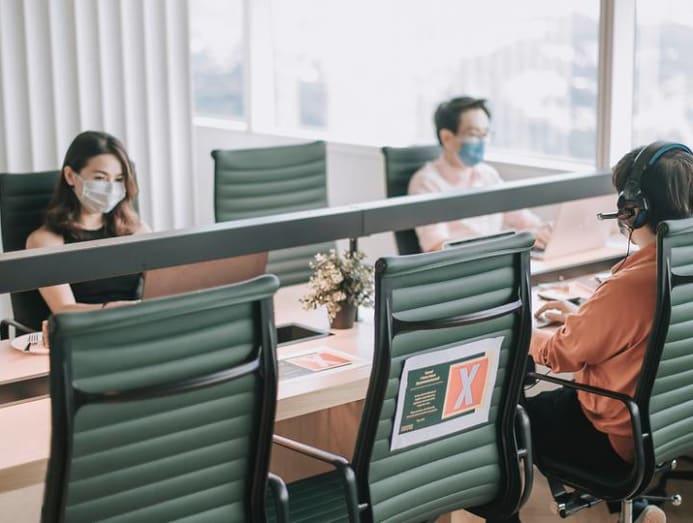Commentary: Being a middle manager has been exhausting and miserable
Burned out supervisors sure could use some help from company leadership and subordinates, NUS Business School’s Yan Liuxin and Sam Yam Kai Chi highlight.

A middle manager may be the most stressed person in the organisation. (Photo: iStock)
SINGAPORE: Middle managers have borne the brunt of work during the pandemic.
They attended more virtual meetings to hear top management’s decisions and then to communicate these to subordinates. They ensured ground operations continued smoothly in compliance with changing regulations.
They motivated their employees, at a time when they themselves may feel overwhelmed.
So it’s little wonder they are feeling burned out.
While there have not been studies focused on the mental health of middle managers in Singapore, a survey by Slack with over 9,000 knowledge workers globally last October showed that middle managers felt the most amount of stress with remote working, compared to senior management and individual contributors.
This group also had the lowest scores in productivity and overall satisfaction.
ORGANISATIONS MUST PAY ATTENTION TO HOW MIDDLE MANAGERS ARE DOING
Do their organisations appreciate their hardships? We would urge more to take a harder look at how their middle managers are faring.
Much is at stake when such supervisors are the true engines of business who keep the massive machinery going and keep people together.
Doing so requires that they not only continue to engage and proactively guide direct reports, but also act as true partners to company leadership – all in a time of great uncertainty and potentially conflicting demands from various stakeholders.

While most people usually look to CEOs to drive an organisation’s performance, a survey by the Boston Consulting Group and the World Federation of People Management Associations in 2010 suggested that middle managers are in fact much more critical than company leadership in driving employee performance.
Likewise, academic research has revealed the behaviours and leadership of middle managers are more accurate tell-tale signs of how well a unit is performing.
BURNOUT CAN TRICKLE DOWN
The pandemic has transformed the modern workplace from the traditional physical office to a virtual setting, with work-from-home (WFH) presenting tremendous challenges to middle managers, who struggled in adjusting their supervising style to this new reality.
How well middle managers do can trickle down. A study in the United States published in the Journal of Applied Psychology in August suggests that when subordinates perceive their leaders to be trustworthy and effective in handling the pandemic, their own emotions and well-being tend to be better too.
Managers unable to handle the transition well could conversely impact followers.
The idea that “e-managers” can sometimes turn unethical and abusive is not new. In the past when WFH is mostly a flexible work arrangement option that is voluntary, research has already raised ethical concerns for e-leaders.
For example, e-managers may load their remote workers with too much work, given the lack of a clear distinction between office hours and non-working hours.
Managers can also turn toxic in pushing subordinates to work harder and demanding they stay contactable even after work hours - practices harmful for employee well-being.
Indeed, a study on employees’ tweets conducted last year by the University of Minnesota found that one of the most common complaints from teleworkers is the lack of work-life balance. Although this can be attributed to multiple reasons, overly controlling managers exacerbate the effects.
Perhaps they’re trying to seize back authority after a loss of direct sight of over their subordinates with remote working.
Research as early as 2002 already suggests that a major reason managers are reluctant to implement WFH is their fear of losing control and hesitance over delegating to their subordinates.
Managers unwilling to delegate may even become more controlling and autocratic to maintain a sense of power, especially if they face pressure to perform from top leadership.
Such counter-productive managerial behaviours arise when there is a lack of trust, a gap in expectations, and miscommunication between supervisors and employees.
HOW WORKERS CAN DEAL WITH A DEMORALISED SUPERVISOR
What if this sounds like your boss? Fret not.
Employees can fight back the gloom simply by being more proactive in seeking feedback from their manager.
Such exchanges allow both employees and managers to better understand each other’s goals, capabilities and motivations.
This two-way street of working has shown to build trust, respect, and mutual respect effectively.
Employees who proactively seek feedback reassure managers that they are attentive and motivated, tackling a common primary concern that a lack of active monitoring would lead workers to slack off.

Furthermore, seeking feedback can be clarifying and empowering for workers too by helping them crystalise expectations and take timely corrective actions. The pandemic has introduced frequent changes at work, fueling mental burnout and lower job satisfaction and this is one simple way to wrestle back control.
A study on healthcare professionals in Wuhan, China during the first wave of the virus shows being active and choosing to shape conditions around one’s work during a crisis can boost mental well-being and resilience.
TAKE ADVANTAGE OF FLEXIBLE WORK ARRANGEMENTS
What can companies do to arrest depleting morale and improve the overall organisational climate?
One suggestion looms – giving people flexibility in where they work.
As Singapore potentially looks to ease restrictions after Oct 24, many may wonder how much freedom they have in deciding where to work – and whether they can make daily decisions about going back to the physical office or continue to telework.
Asynchronous work may be our reality. Few want a pure WFH arrangement or rigidity in having to lug themselves back to the office.
Research from China in June also suggests that WFH and work at the office helps people manage different stressors. Employees concerned about workload are more likely to stay home to focus and power through work. Those needing a break from family and having trouble coordinating with colleagues find heading to the office helpful.
Of course, not all work and roles can afford to. But we hope people take comfort in the idea that there are some easy ways for employees and middle managers to stay positive amid the stress from the pandemic.
Of course, the pressure should not be placed on employees’ shoulders alone. In a post-COVID era, middle managers also need to explore and develop new skills to adapt to new leadership demands.
Yan Liuxin is a PhD candidate with the Department of Management & Organisation at National University of Singapore (NUS) Business School.
Associate Professor Sam Yam Kai Chi is Deputy Head of the Department of Management and Organisation, Dean’s Chair and Assistant Dean (Faculty Development) at NUS Business School.
The opinions expressed are those of the writers and do not represent the views and opinions of NUS














